The COVID-19 pandemic is a global health emergency that may demand new, safe, and expedited ways of conducting ethical research to find the solutions we need, including a safe and effective vaccine. With most of the world’s population pinning hopes of a return to work and life outside of isolation on the development and delivery of a SARS-CoV-2 vaccine, research is moving at unprecedented speed. As researchers look for ways to shave off a few months in the time to discovery, development, expedited approval, manufacture to scale and equitable delivery of a COVID-19 vaccine, controlled human infection studies (or “human challenge trials”) are now being discussed as a way to possibly shorten the timeline for vaccine efficacy studies.
On Wednesday, May 6, 2020, the WHO Working Group for Guidance on Human Challenge Studies in COVID-19 released a report which stated that well designed challenge studies could accelerate COVID-19 vaccine development. The WHO Working Group lays out eight criteria for SARS-CoV-2 challenge studies that would need to be satisfied for studies to be ethically acceptable.
The WHO Working Group has articulated important criteria for assessing a challenge study, but we believe that they left out the most important one: Until there is an approved treatment, a challenge trial with a potentially fatal and as-yet untreatable pathogen is unacceptable.
In recent times, live pathogen challenge trials have been conducted in diseases where a safe, effective approved treatment is available, or for which pathogenesis and risks are reasonably well characterized. That is not the case for COVID-19, which means that adequately communicating about and assessing potential risks and benefits of participating in a challenge study and ensuring appropriate informed consent may be impossible.
Challenge trials are also most useful when it is difficult to recruit enough participants at high risk of measurable incidence to carry out a regular placebo-control study. As COVID-19 cases grow exponentially in communities around the world, it is clear that researchers will be able to enroll placebo-controlled efficacy trials among participants at high risk of SARS-CoV-2 acquisition who will be able to understand the risks and benefits and give true informed consent. Moreover, in this case, a placebo is highly likely to be safer than a live challenge for a significant number of those at risk in a disease with a currently estimated case fatality rate (CFR) greater than 1 percent.
While there has been increased coverage of the potential for live virus challenge vaccine studies in SARS-CoV-2, we do not believe that individuals’ expressed willingness to participate in such a trial is an adequate or appropriate measure of informed consent. The current discussion in scientific journals and in social and mainstream media cannot substitute for the needed stakeholder engagement to ensure that individuals and communities have input into what amounts to a radical and potentially dangerous, destructive and distracting change in the way research is done.
Moreover, before any challenge studies can be designed and conducted, researchers will need to develop and validate a challenge virus, a time-consuming process in its own right. During that time, it is possible that treatment(s) will emerge that will change the equation. But that is not guaranteed. If researchers move to develop a challenge model for SARS-CoV-2 vaccines, there must be a parallel process of rigorous ethical review and stakeholder engagement that addresses community and individual concerns and questions about this research.
Stakeholder engagement, as guided by Good Participatory Practice Guidelines, is a cornerstone of biomedical research. Expedited research timelines cannot short change robust engagement across a broad range of stakeholders. It is possible and necessary to ensure stakeholder input in plans for potential challenge studies.
Since the early days of the HIV epidemic, TAG and AVAC have each engaged with and advocated for accelerated research timelines, innovative trial designs, and meaningful community engagement for HIV, TB and health research. We are working with our global partners representing communities severely impacted and at risk for COVID-19 and other community and stakeholder representatives to develop a global community advisory mechanism that could work with WHO, vaccine developers and researchers, and research sponsors to ensure SARS-CoV-2 vaccine research happens to the highest possible scientific, ethical and public health standards and in the fastest possible way.
We call for the WHO to empanel a standing committee that includes researchers and ethicists involved in the WHO working group along with community representatives, policy makers, regulators, vaccinologists, infectious disease and public health experts to address the ethics of live SARS-CoV-2 challenge trials and review protocols. We must all work to ensure no unnecessary delays, but also no short-cuts which place participants at unacceptable risk of illness and death.
